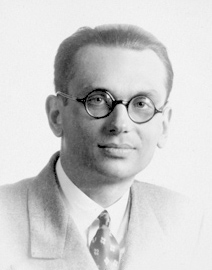Kurt Gödel
 Kurt Friedrich Gödel ( ; ; April 28, 1906 – January 14, 1978) was a logician, mathematician, and philosopher. Considered along with Aristotle and Gottlob Frege to be one of the most significant logicians in history, Gödel profoundly influenced scientific and philosophical thinking in the 20th century (at a time when Bertrand Russell, Alfred North Whitehead, and David Hilbert were using logic and set theory to investigate the foundations of mathematics), building on earlier work by Frege, Richard Dedekind, and Georg Cantor.
Kurt Friedrich Gödel ( ; ; April 28, 1906 – January 14, 1978) was a logician, mathematician, and philosopher. Considered along with Aristotle and Gottlob Frege to be one of the most significant logicians in history, Gödel profoundly influenced scientific and philosophical thinking in the 20th century (at a time when Bertrand Russell, Alfred North Whitehead, and David Hilbert were using logic and set theory to investigate the foundations of mathematics), building on earlier work by Frege, Richard Dedekind, and Georg Cantor.Gödel's discoveries in the foundations of mathematics led to the proof of his completeness theorem in 1929 as part of his dissertation to earn a doctorate at the University of Vienna, and the publication of Gödel's incompleteness theorems two years later, in 1931. The incompleteness theorems address limitations of formal axiomatic systems. In particular, they imply that a formal axiomatic system satisfying certain technical conditions cannot decide the truth value of all statements about the natural numbers, and cannot prove that it is itself consistent. To prove this, Gödel developed a technique now known as Gödel numbering, which codes formal expressions as natural numbers.
Gödel also showed that neither the axiom of choice nor the continuum hypothesis can be disproved from the accepted Zermelo–Fraenkel set theory, assuming that its axioms are consistent. The former result opened the door for mathematicians to assume the axiom of choice in their proofs. He also made important contributions to proof theory by clarifying the connections between classical logic, intuitionistic logic, and modal logic. Provided by Wikipedia